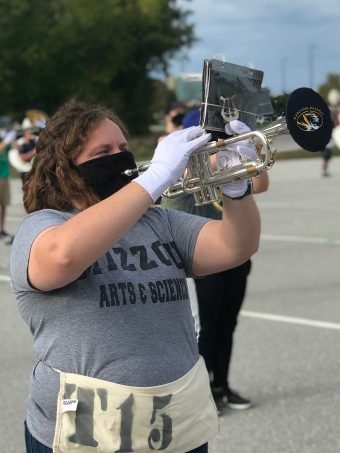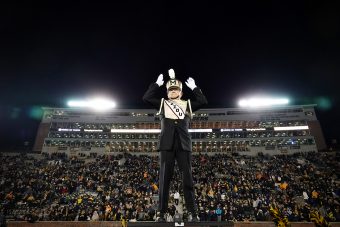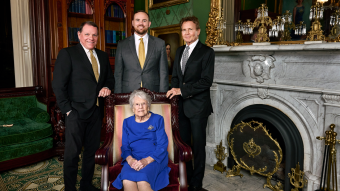Nov. 2, 2020
Contact: Kenny Gerling, gerlingk@missouri.edu

Catherine Hutinett, a history and anthropology major, has played trumpet in Marching Mizzou since her first semester on campus. She was a junior last spring when a band trip to Ireland was canceled due to the pandemic. Soon after, she began to wonder if her final year as a Tiger would be a quiet one.
“At first, the anxiety was that we don’t get to go to Ireland,” Hutinett said. “As summer progressed, we worried we wouldn’t get to have a senior year.”
A cornerstone of Mizzou’s Show Me Renewal plan, which outlines how to safely conduct on-campus activities, is wearing a face covering. This raises a challenge for a marching band: How do you cover your mouth and play an instrument?
The solution was right in front of their faces.
In August, Marching Mizzou acquired face masks designed for woodwind and brass players. A small opening allows for the inclusion of a mouthpiece. Additional fabric forms a pocket around the area to limit the escape of aerosols, the small droplets that contribute to the spread of COVID-19.
A new kind of mask
Amy M. Knopps, an associate director of bands and director of Marching Mizzou, said the masks comply with the latest science-based safety recommendations.
Over the summer, the College Band Directors National Association (CBDNA), of which Knopps is a member of the CBDNA Athletic Bands Committee, and the National Federation of State High School Associations partnered on a study used to establish best practices for performing arts organizations in the COVID-19 era. The final report found that surgical-style masks modified for inclusion of a mouthpiece were an effective tool in limiting the coronavirus’s spread by musicians. The study also recommended the use of bell covers over instrument openings and social distancing.
“Once we had these recommendations, a lot of the instrument and uniform companies we work with started commercially producing bell covers and masks,” Knopps said. Professionally manufactured “player” masks also began appearing just weeks after the report.
Out on the field

Bill Moyes — a former member of Marching Mizzou, a current member of the Marching Mizzou Alumni Band and a loyal supporter of the program — offered to supply the masks. Moyes said that he and his wife, Alice Wondra, were eager to help how they could. “It had to be done,” he said. “From a safety standpoint, it met the COVID-19 guidelines and it had the uniformity they were looking for.”
Moyes is glad Marching Mizzou found a way to keep playing, even if he can only watch from a distance. “I saw — and heard — the band on TV,” he said, referring to the first football home game. “I’m happy to know I’ve made my contribution to them.”
Hutinett, armed with her trumpet and mask, was at that Sept. 26 game against Alabama. Though she acknowledged a “learning curve” to playing in a mask, she’s pleased with what they allow the band to accomplish.
“We have strong leadership at Marching Mizzou, and we are fortunate to do this when so many other universities are online,” Hutinett said. “I am grateful to do this one last time, even if it does look a little weird.”



